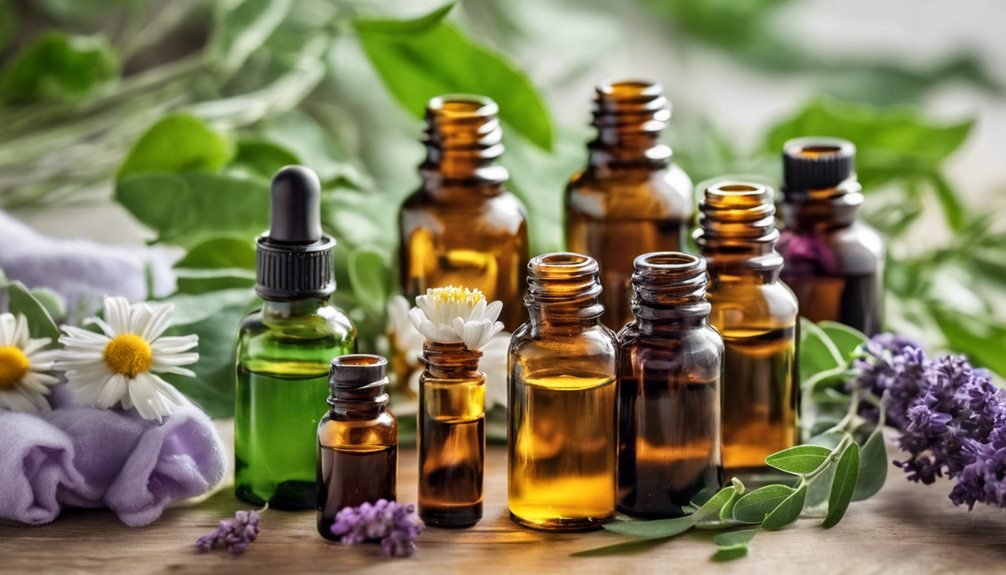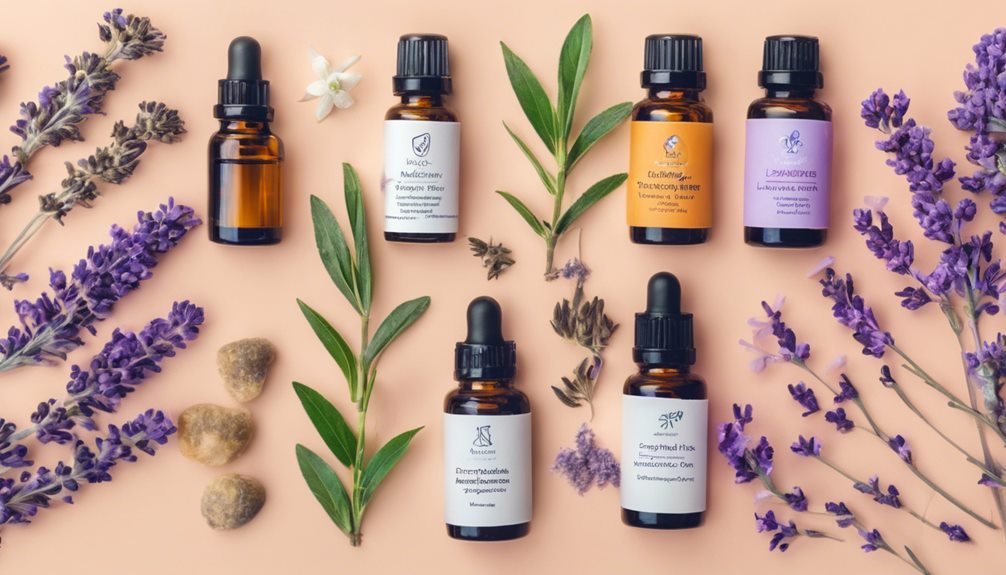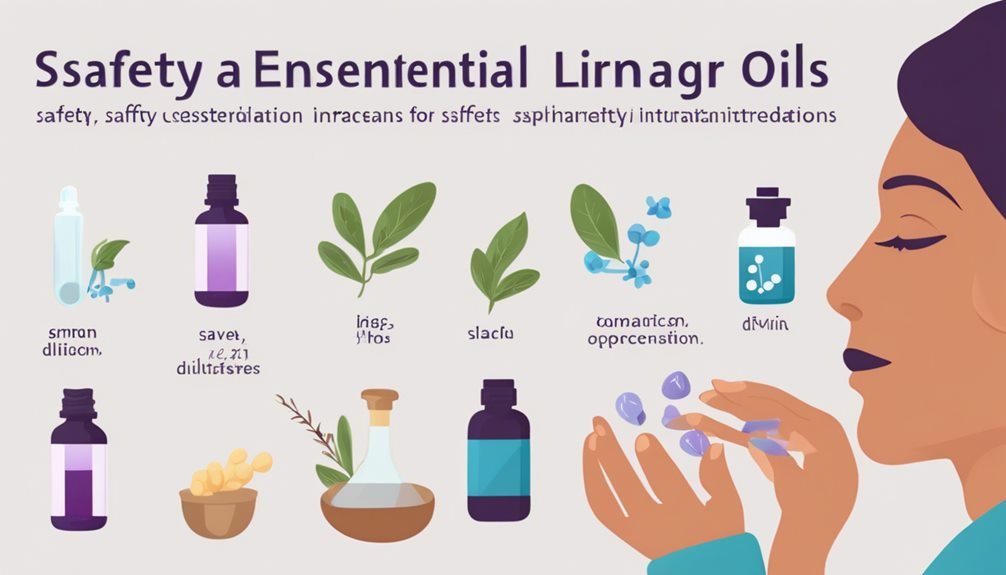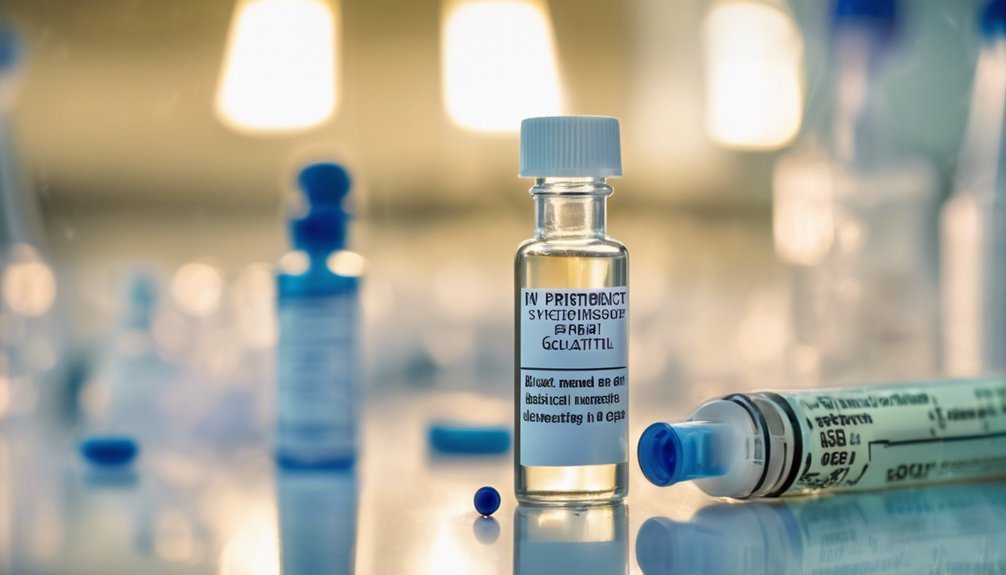You may wonder about the potential benefits of essential oils in cancer treatment. While some studies suggest that essential oils could offer supportive effects in managing symptoms and improving well-being for cancer patients, the question of their efficacy remains a topic of ongoing research and discussion. Understanding the mechanisms behind how essential oils interact with cancer cells and conventional treatments is crucial in determining their role in comprehensive cancer care. Exploring the current scientific evidence and expert opinions can shed light on the complexities of utilizing essential oils in cancer treatment protocols.
Key Takeaways
- Essential oils can aid cancer treatment through symptom management and well-being improvement.
- Some oils have anti-inflammatory and antioxidant properties beneficial in cancer care.
- Aromatherapy with essential oils can help in pain management and fatigue reduction.
- Certain oils possess antimicrobial properties and may enhance the immune system.
- Consultation with healthcare professionals is crucial for safe and effective integration of essential oils in cancer treatment.
Understanding Essential Oils
When it comes to understanding essential oils, it's essential to grasp their potent therapeutic properties and their potential impact on health. Essential oils have been used for centuries, primarily in aromatherapy, to promote overall well-being. In the context of cancer treatment, essential oils are being increasingly researched for their potential benefits.
Aromatherapy benefits of essential oils have been shown to help reduce stress and anxiety levels, improve sleep quality, and enhance relaxation. These benefits are especially valuable for individuals undergoing cancer treatment, as managing stress and promoting relaxation can contribute to a better quality of life during this challenging time.
In the realm of cancer treatment, essential oils are being explored for their potential to complement conventional therapies. While essential oils aren't a cure for cancer, they may offer supportive benefits such as alleviating treatment side effects like nausea, fatigue, and pain.
Understanding the role of essential oils in cancer treatment requires careful consideration and consultation with healthcare professionals. Integrating essential oils into a comprehensive care plan can be a holistic approach to supporting overall well-being throughout the cancer treatment journey.
Aromatherapy and Cancer
Exploring the intersection of aromatherapy and cancer reveals a burgeoning field of research focused on the potential benefits of essential oils in supporting individuals undergoing cancer treatment. Aromatherapy benefits in cancer therapy are being increasingly recognized for their potential to provide comfort and relief to cancer patients.
While essential oils aren't a standalone treatment for cancer, they can play a supportive role in managing symptoms and improving quality of life during cancer therapy.
Studies have shown that certain essential oils, such as lavender and peppermint, may help alleviate chemotherapy-induced nausea and vomiting, reduce anxiety, and improve sleep quality in cancer patients. Additionally, aromatherapy massage with essential oils like chamomile and rosemary has been found to reduce pain and fatigue levels in cancer patients undergoing treatment.
Incorporating aromatherapy into cancer therapy can offer a holistic approach to care, addressing not only the physical symptoms but also the emotional and psychological well-being of individuals facing cancer.
Anti-inflammatory Properties

As you consider the potential benefits of essential oils in cancer therapy, it's important to explore their anti-inflammatory properties. Scientific evidence suggests that certain essential oils possess anti-inflammatory properties that may aid in cancer treatment. Clinical trials have shown that some essential oils can help reduce inflammation in the body, which is crucial in cancer management.
For example, studies have indicated that compounds found in essential oils like frankincense and turmeric have potent anti-inflammatory effects. These properties can be beneficial for cancer patients as inflammation plays a significant role in tumor growth and progression.
Antioxidant Effects
To delve into the realm of essential oils and their potential benefits in cancer treatment, it is essential to uncover their antioxidant effects. Essential oils, through their antioxidant properties, play a vital role in cellular protection and free radical scavenging. These effects are crucial in the context of cancer treatment as they help in combating oxidative stress, which is often elevated in cancer patients.
| Antioxidant Effects | Benefits |
|---|---|
| Cellular Protection | Helps protect cells from damage caused by free radicals. |
| Free Radical Scavenging | The ability to neutralize harmful free radicals that can lead to cell damage and mutation. |
Pain Management Support

Amidst the multifaceted approach to cancer care, essential oils have shown promise in providing support for pain management. Pain is a significant concern for individuals undergoing cancer treatment, and palliative care plays a crucial role in enhancing the quality of life for patients. Integrative therapy, which includes the use of essential oils, aims to address pain through a holistic approach that complements conventional medical interventions.
Certain essential oils like lavender, frankincense, and peppermint have demonstrated analgesic properties that can help alleviate cancer-related pain. Lavender, for example, has been found to have calming effects, which can reduce the perception of pain and promote relaxation.
Frankincense possesses anti-inflammatory properties that may help with pain associated with inflammation, while peppermint has a cooling effect that can offer relief for discomfort.
Integrating essential oils into pain management protocols can provide a natural and gentle option for symptom relief, enhancing the overall well-being of cancer patients. By incorporating these oils into palliative care strategies, individuals may experience improved comfort and a better quality of life during their cancer journey.
Stress and Anxiety Reduction
Navigating the challenges of cancer treatment involves addressing various aspects of well-being, including stress and anxiety. Essential oils can play a role in supporting mental health and emotional well-being during this difficult time. Here are three ways in which essential oils may help in reducing stress and anxiety:
- Calming Effects: Certain essential oils like lavender and chamomile have been shown to have calming effects on the mind and body, promoting relaxation and reducing feelings of anxiety.
- Stress Reduction: Aromatherapy using essential oils such as rosemary and peppermint may help in lowering stress levels by activating certain receptors in the brain that are linked to stress response.
- Emotional Support: Essential oils like bergamot and ylang-ylang can aid in uplifting mood and providing emotional support, potentially easing feelings of anxiety and promoting a sense of well-being.
Nausea and Vomiting Relief

For individuals undergoing cancer treatment, finding relief from nausea and vomiting is crucial in maintaining comfort and quality of life. Essential oils can play a role in symptom management and providing support during chemotherapy. Peppermint oil, known for its anti-nausea properties, has shown effectiveness in reducing chemotherapy-induced nausea and vomiting. Inhaling the scent of peppermint oil or applying it topically may help alleviate these distressing symptoms.
Ginger oil is another essential oil that has been studied for its potential benefits in managing nausea. Research suggests that inhaling ginger oil can help reduce nausea and vomiting in cancer patients undergoing chemotherapy. Its anti-inflammatory properties may also contribute to easing gastrointestinal discomfort.
Lavender oil, commonly used for relaxation, may aid in reducing nausea and vomiting by promoting a sense of calmness and alleviating anxiety, which are often associated with these symptoms during cancer treatment.
When considering essential oils for nausea and vomiting relief, it's essential to consult with healthcare professionals to ensure they complement existing treatment plans effectively.
Immune System Boost
When managing the challenges of cancer treatment, supporting your immune system becomes a key aspect of your overall well-being. Essential oils can play a role in providing immune support and enhancing your treatment. Here are three ways essential oils can help boost your immune system during cancer treatment:
- Reducing Inflammation: Certain essential oils like frankincense and turmeric have anti-inflammatory properties that may help reduce inflammation in the body, supporting a healthier immune response.
- Enhancing Immune Response: Some essential oils, such as tea tree oil and eucalyptus, are known for their antimicrobial properties. By incorporating these oils into your routine, you may help your immune system fight off infections more effectively.
- Stress Reduction: Essential oils like lavender and chamomile can help reduce stress and promote relaxation. Chronic stress can weaken the immune system, so using these oils may indirectly support your body's ability to combat illness.
Skin Care Benefits

To address the Skin Care Benefits of essential oils, it is essential to recognize the significance of maintaining skin health during cancer treatment. The healing properties of certain essential oils can provide a natural remedy for various skin issues that may arise during cancer therapy. These oils have been shown to soothe irritation, reduce inflammation, and promote overall skin wellness, offering a gentle and effective option for those undergoing treatment.
| Skin Issue | Recommended Essential Oils |
|---|---|
| Dryness & Itching | Lavender, Chamomile, Calendula |
| Redness & Sensitivity | Frankincense, Rose, Geranium |
| Wounds & Scarring | Helichrysum, Tea Tree, Myrrh |
Potential Side Effects
Experiencing potential side effects during cancer treatment is a common concern that many individuals face. When considering the use of essential oils as a complementary therapy, it's essential to be aware of the risks involved and potential adverse reactions that could arise. Here are some important points to keep in mind:
- Skin Irritation: Essential oils are highly concentrated substances and can cause skin irritation, especially if not properly diluted. It's crucial to perform a patch test before using any new essential oil topically to avoid adverse skin reactions.
- Respiratory Issues: Inhaling essential oils directly or through diffusers can trigger respiratory problems in some individuals, particularly those with existing lung conditions like asthma. Proper ventilation and moderation in usage are key to minimizing these risks.
- Drug Interactions: Essential oils can interact with certain medications, impacting their effectiveness or causing unwanted side effects. It's vital to consult with a healthcare provider before incorporating essential oils into your cancer treatment regimen to ensure compatibility with other treatments and medications.
Safety Considerations

Considering the use of essential oils as a complementary therapy for cancer treatment necessitates a thorough understanding of safety considerations. When incorporating essential oils into your regimen, it's crucial to be aware of potential toxicity risks. Essential oils are highly concentrated plant extracts that can cause adverse effects if not used appropriately. It's vital to follow proper dosage guidelines to avoid any harmful outcomes.
Toxicity risks can arise when essential oils are ingested in large quantities or applied directly to the skin without dilution. Certain essential oils may also interact with medications or exacerbate existing health conditions if used incorrectly. Always consult with a qualified healthcare professional before integrating essential oils into your cancer treatment plan to ensure safety and effectiveness.
Dosage guidelines vary depending on the type of essential oil and the individual's health status. It's essential to start with small amounts and gradually increase as needed while monitoring for any adverse reactions. By prioritizing safety considerations and adhering to dosage recommendations, you can harness the potential benefits of essential oils in a safe and effective manner.
Current Research Findings
As research in the field of oncology advances, current findings on the potential benefits of essential oils in cancer treatment continue to emerge. Here are some key insights:
- Clinical Trials: Recent clinical trials have shown promising results regarding the use of certain essential oils in alleviating cancer symptoms and improving the quality of life for patients undergoing treatment.
- Patient Testimonials: Numerous patient testimonials have highlighted the positive impact of incorporating essential oils into their cancer care routines. Many have reported reduced stress, improved sleep, and a sense of well-being when using these natural remedies alongside traditional treatments.
- Future Directions: Researchers are now focusing on identifying specific mechanisms of action of essential oils in cancer cells, as well as exploring potential synergies with conventional therapies to enhance treatment outcomes.
These emerging research findings underscore the growing interest and potential of essential oils as complementary tools in the holistic approach to cancer care.
Frequently Asked Questions
Can Essential Oils Cure Cancer on Their Own?
Essential oils, while popular in alternative therapies, can't cure cancer on their own. Clinical trials haven't shown them to be a standalone treatment. It's crucial to rely on evidence-based methods recommended by healthcare professionals. Seeking complementary therapies like aromatherapy under medical supervision can provide comfort, but they should never replace conventional cancer treatments.
Are Essential Oils Safe to Use During Chemotherapy?
During chemotherapy, essential oils can offer benefits like reducing nausea and anxiety. However, always consult with your healthcare provider before using them. Some essential oils may interact with medications or exacerbate chemotherapy side effects. Safety is key, so ensure the oils you choose are high quality and pure.
Prioritize your well-being by discussing any plans to use essential oils with your medical team for personalized guidance and support.
Can Essential Oils Interfere With Cancer Medications?
Using essential oils alongside cancer medications can pose potential risks like interference with drug metabolism. Efficacy concerns may arise due to the lack of scientific evidence supporting the combination's benefits. It's essential to prioritize safety and consult with healthcare providers before incorporating essential oils into your cancer treatment regimen. Understanding the complexities of drug interactions can help ensure the effectiveness of your prescribed medications and avoid any unintended consequences.
How Do Essential Oils Affect Cancer Cells Specifically?
Imagine essential oils as nature's gentle warriors, targeting cancer cells with precision. They can induce cell apoptosis, a natural process where damaged cells self-destruct, halting tumor growth. Specific oils like frankincense and lavender have shown promise in research for their anti-cancer properties.
While not a standalone treatment, when used alongside conventional therapies, essential oils may complement cancer treatment by potentially aiding in the fight against cancer cells.
Are There Any Essential Oils That Should Be Avoided for Cancer Patients?
When considering essential oils for cancer patients, it's crucial to be aware of potential risks and safety concerns. Some oils, like wintergreen and eucalyptus, may not be suitable due to their strong components.
Always consult with a healthcare professional before using essential oils during cancer treatment. Your well-being is a top priority, and understanding which oils to avoid can help ensure a safe and supportive approach to your care.
Conclusion
In conclusion, essential oils can offer support in cancer treatment by providing relief from symptoms, managing stress, and promoting overall well-being. Remember, "where there is a will, there is a way," and integrating essential oils into your cancer care routine may be a valuable addition with the guidance of healthcare professionals. Stay informed, stay safe, and explore the potential benefits of essential oils in your cancer treatment journey.






